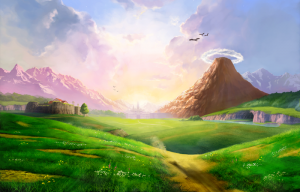25 years of Zelda: An in-depth look at the greatest video game franchise ever
Don’t misunderstand me, though; the reason for Nintendo being able to erect such a powerful suspension of disbelief is not simple to explain nor is it easy to diagnose. I’ve been trying to put the “Nintendo difference” into readable words for around the past century now to no avail, but after a few hours in thought and careful study, I have found a few tangible things that I think separate the immersive experience we get in Zelda with those we may feel through other, non-Nintendo titles:
– Sound effects and music interact with the gameplay in very satisfying and fitting ways.
– There is a little pause that happens when a player hits an enemy or gets hit by an enemy.
– All of their games have a smooth, fast framerate.
– Load and save times are either very short or virtually nonexistent.
– Loading screens are cleverly disguised to feel more seamless.
– Custom text fonts are used to fit with the theme of a game.
– Tutorials are immersed in the game world, and often have something of an impact on the story.
– Ultimately, there is a sense of accessibility to everything.
All of these things have been gaining less and less importance in gaming as time goes on, and the emphasis on a smoothness and efficiency is being replaced by a longing for HD graphics and massive game worlds. I’m not against the latter form of game creation, but it’s needless to say that I much prefer a streamlined and accessible experience to a good-looking but inaccessible one.
I think one of the most impressive things about the Zelda series is that it can be endlessly child-friendly, and still capture us in ways that we could seldom dream up elsewhere. This is fitting though, because there is an incredibly clear and harsh difference between the sorts of games that traditionally appeal to children, and the sorts of games that traditionally appeal to adults. Those that are aimed at adults have sexual themes, mature humor, vulgarity, violence, and gore, and the opposite is true for child-friendly games. Don’t mistake me for someone that is against these things and thinks they should be banished- simply realize that I find it far more impressive and ultimately satisfying when a story can be told without sarcasm, vulgarity, and violence, yet still have and powerful impact. What is left over after you banish the naysayers, Call of Duty-aficionados, and blood-splattering demons of gamers out there is something that feels incredibly untouched, uncompromising, and innocent. I’m not entirely sure that anyone out there will understand me with this, but playing Zelda feels clean.
The last thing I want to mention holds an importance in my head that rivals gameplay, graphics, story, and controls combined. It is the one thing that, in a lack of, the Zelda games would cease to have even half of the impact they have currently. Of course, I’m talking about the music of the series, which can single-handedly take me on an out-of-this-world quest without so much as a putting a controller in my hands. Sprawling melodies and atmospheric undertones leave me absolutely breathless, and simply listening to any tune- whether it be the cheery Outset Island jig or the epochal Hyrule Field theme- transports me instantaneously into the land of Hyrule. I don’t want to start gushing too much about the brilliance of the soundtracks (I could honestly do an entire feature on them), but I truly believe that nearly half of the reason Zelda has the impact it does is purely because of the sound design and musical compositions. It’s pure magic.
